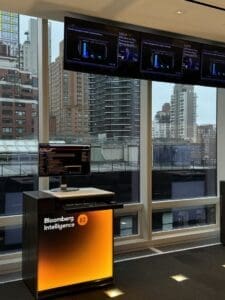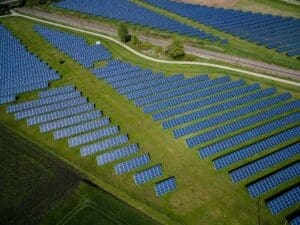 Yesterday afternoon, I had the privilege of joining Bloomberg Intelligence for insightful sessions on ESG Investment Themes for 2025. The discussions were rich with knowledge and actionable insights, and I’m excited to share a few highlights. Key themes for 2025 included carbon removal, sustainable debt and risks, powering the transition (and AI), addressing supply chain challenges, and exploring the value of nature-based solutions.
Yesterday afternoon, I had the privilege of joining Bloomberg Intelligence for insightful sessions on ESG Investment Themes for 2025. The discussions were rich with knowledge and actionable insights, and I’m excited to share a few highlights. Key themes for 2025 included carbon removal, sustainable debt and risks, powering the transition (and AI), addressing supply chain challenges, and exploring the value of nature-based solutions.
Among the key takeaways, it was noted that the carbon market is evolving with shifts in funding—avoidance strategies, or “stop the faucet,” are largely driven by private sector funding, while offtake strategies, or “pick up the mop,” are currently publicly funded, though this may change with the next US administration. Additionally, AI is reshaping energy demand, as the rising energy needs of data centers could delay coal plant retirements and increase LNG demand, posing challenges for clean energy transitions. Supply chain compliance has become mandatory, with regulations like CSRD, CSDD, and UFLPA reshaping trade and corporate investment strategies. IRA credits and investments, though uncertain, are still delivering tangible benefits, particularly in GOP-led states. Emissions reductions in the US are progressing slower than expected, highlighting the urgency for innovation and action. These discussions provided a sobering yet motivating perspective on the challenges and opportunities ahead in ESG investing, underscoring that ESG principles are here to stay, regardless of political debates.
Now let’s get into the news for the week!
Automated Vehicle Startup, Embostech Raises 27 Million USD in Series B Funding

 Embotech, a Swiss innovator in autonomous driving solutions for industrial logistics, has secured 23.5 million CHF in Series B funding led by Emerald Technology Ventures and Yttrium, alongside key investors like BMW i Ventures. This funding will support scaling its Automated Vehicle Marshalling (AVM) and Autonomous Terminal Tractor (ATT) solutions across Europe and beyond. Embotech’s AVM technology, operational in BMW plants since 2023, facilitates driverless vehicle transport during production, achieving scalability and adaptability to diverse factory layouts. Meanwhile, its ATT solution is poised for deployment at Europe’s largest port in Rotterdam, enhancing container transport with Level 4 autonomy in mixed traffic. By streamlining operations and reducing costs, CO2 emissions, and reliance on drivers, Embotech’s solutions promise safer, more efficient, and sustainable logistics, positioning the company as a leader in autonomous logistics innovation.
Embotech, a Swiss innovator in autonomous driving solutions for industrial logistics, has secured 23.5 million CHF in Series B funding led by Emerald Technology Ventures and Yttrium, alongside key investors like BMW i Ventures. This funding will support scaling its Automated Vehicle Marshalling (AVM) and Autonomous Terminal Tractor (ATT) solutions across Europe and beyond. Embotech’s AVM technology, operational in BMW plants since 2023, facilitates driverless vehicle transport during production, achieving scalability and adaptability to diverse factory layouts. Meanwhile, its ATT solution is poised for deployment at Europe’s largest port in Rotterdam, enhancing container transport with Level 4 autonomy in mixed traffic. By streamlining operations and reducing costs, CO2 emissions, and reliance on drivers, Embotech’s solutions promise safer, more efficient, and sustainable logistics, positioning the company as a leader in autonomous logistics innovation.
Siemens Deploys SiGreen in Partnership with Glassdome to Improve Data Exchange for Regulatory Frameworks

 Glassdome, a leading industrial software company, and Siemens have partnered to simplify Product Carbon Footprint (PCF) assessment for manufacturers, starting with a proof of concept with LG Electronics Vehicle Solution. This collaboration combines Glassdome’s expertise in automating machine-level data collection with Siemens’ SiGREEN data-sharing solution to help manufacturers efficiently monitor, calculate, and report supply chain and product-level emissions. Particularly relevant for automotive and EV battery manufacturers, the partnership addresses the challenges of integrating complex supply chain data to meet strict EU regulatory requirements, including the 2025 EU Batteries Regulation. By enabling seamless data exchange through Catena-X and other ecosystems, this initiative supports global manufacturers in enhancing supply chain transparency, achieving regulatory compliance, and strengthening sustainability efforts.
Glassdome, a leading industrial software company, and Siemens have partnered to simplify Product Carbon Footprint (PCF) assessment for manufacturers, starting with a proof of concept with LG Electronics Vehicle Solution. This collaboration combines Glassdome’s expertise in automating machine-level data collection with Siemens’ SiGREEN data-sharing solution to help manufacturers efficiently monitor, calculate, and report supply chain and product-level emissions. Particularly relevant for automotive and EV battery manufacturers, the partnership addresses the challenges of integrating complex supply chain data to meet strict EU regulatory requirements, including the 2025 EU Batteries Regulation. By enabling seamless data exchange through Catena-X and other ecosystems, this initiative supports global manufacturers in enhancing supply chain transparency, achieving regulatory compliance, and strengthening sustainability efforts.
Boeing Announces 1 Billion Dollar Investment to Support Production of 787 Dreamliner Jet

 Boeing has announced a $1 billion investment to expand its Charleston, South Carolina, facility and support increased production of its 787 Dreamliner jets, aiming to reach a monthly output of 10 by 2026. The expansion will include infrastructure upgrades and the creation of 500 jobs over five years, positioning Boeing to meet rising demand for widebody planes driven by international travel growth. The planemaker faces competition from Airbus, which plans to increase production of its A350 to 12 per month by 2028. Boeing’s ramp-up follows challenges with supply chain delays, quality issues, and a recent strike but marks a critical effort to restore production levels and improve cash flow.
Boeing has announced a $1 billion investment to expand its Charleston, South Carolina, facility and support increased production of its 787 Dreamliner jets, aiming to reach a monthly output of 10 by 2026. The expansion will include infrastructure upgrades and the creation of 500 jobs over five years, positioning Boeing to meet rising demand for widebody planes driven by international travel growth. The planemaker faces competition from Airbus, which plans to increase production of its A350 to 12 per month by 2028. Boeing’s ramp-up follows challenges with supply chain delays, quality issues, and a recent strike but marks a critical effort to restore production levels and improve cash flow.
Biden Administration Increases Tariffs on Solar Wafers, Polysilicon, and Tungsten Products

 The Biden administration has announced an increase in Section 301 tariffs on imports of solar wafers, polysilicon, and certain tungsten products from China. Starting January 1, solar wafers and polysilicon will face a 50% tariff, while tungsten products such as bars and sheets will be subject to a 25% tariff. This move aims to counter China’s harmful trade practices and supports U.S. efforts to strengthen clean energy and supply chain resilience. The decision follows previous tariff hikes on Chinese goods, including electric vehicles and semiconductors. The solar industry largely supports the tariffs on polysilicon and wafers, though reactions to the tungsten tariffs have been more mixed.
The Biden administration has announced an increase in Section 301 tariffs on imports of solar wafers, polysilicon, and certain tungsten products from China. Starting January 1, solar wafers and polysilicon will face a 50% tariff, while tungsten products such as bars and sheets will be subject to a 25% tariff. This move aims to counter China’s harmful trade practices and supports U.S. efforts to strengthen clean energy and supply chain resilience. The decision follows previous tariff hikes on Chinese goods, including electric vehicles and semiconductors. The solar industry largely supports the tariffs on polysilicon and wafers, though reactions to the tungsten tariffs have been more mixed.
California Approved $1.4B to Deploy 17,000 EV Chargers, Hydrogen Fueling Infrastructure


The California Energy Commission has approved a $1.4 billion investment plan to support emissions-free transportation in the state, focusing on installing nearly 17,000 new electric vehicle (EV) charging stations and hydrogen refueling infrastructure over the next four years. The plan is part of California’s $48 billion climate budget, with half of the funds dedicated to benefiting disadvantaged communities. This investment builds on California’s goal of expanding its EV charging network, which currently includes 152,000 public chargers, and is aligned with the state’s commitment to zero-emission infrastructure. Governor Gavin Newsom emphasized the importance of accessible charging stations in underserved areas, and California plans to continue supporting EV adoption through state programs, regardless of potential changes to federal incentives.
Song of the week:





















